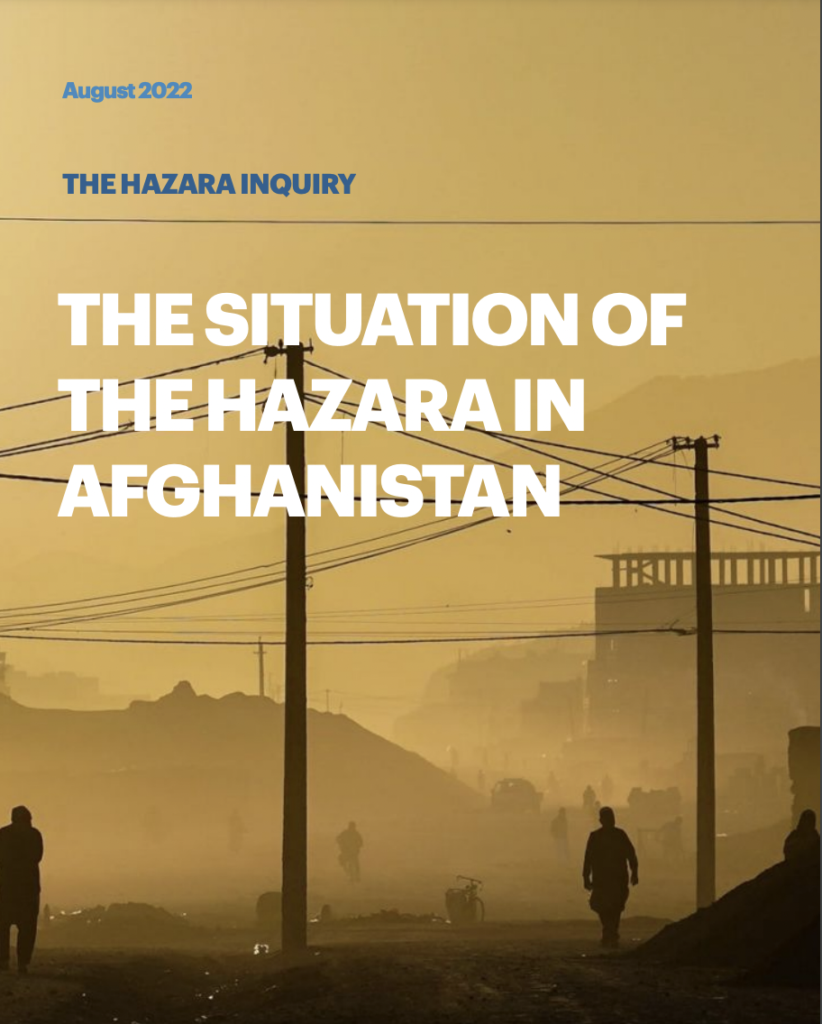In September 2022, the Hazara Inquiry, a joint effort of cross-party Parliamentarians from both Houses and experts, published their report on the situation of the Hazara in Afghanistan since 2021.
The report finds that Hazara in Afghanistan, as a religious and ethnic minority, are at serious risk of genocide at the hands of the Islamic State–Khorasan Province (IS-K) and the Taliban. This finding engages the responsibility of all states to protect the Hazara and prevent a possible genocide, under the UN Convention on the Prevention and Punishment of the Crime of Genocide (the Genocide Convention) and customary international law.

When the Taliban took control of Afghanistan in 2021, it significantly affected the situation faced by the Hazara and reversed the 20-year progress made in addressing the marginalisation and discrimination experienced by this minority group. The return to power of the Taliban has included brutal acts of violence against the Hazara throughout Afghanistan and a return of terror.
The first half of 2022 has seen hundreds of members of the Hazara community killed and many more injured as a result of the targeted attacks, including bombings of Hazara schools, places of worship and other centres. As this report was being finalised in August 2022, IS-K claimed responsibility for several attacks that resulted in over 120 fatalities within a few days only. Further attacks are expected because of the inaction and impunity in response to the targeting of the Hazara. This trend is likely to continue. There is a pressing need to provide the community with protection, in line with international obligations under the Genocide Convention.
Commenting upon the report, Lord Alton of Liverpool, a member of the Hazara Inquiry and patron of the Coalition for Genocide Response, commented that ‘Over recent months, we have witnessed a serious and increasing risk of genocide against the Hazara. It is urgent that we act to protect this vulnerable targeted community before it is too late. The dire situation faced by Afghanistan’s Hazaras will deteriorate further if the crimes committed against them are met by inaction and impunity. We have duties under the Genocide Convention and it is about time we acted upon them.’
Baroness Helena Kennedy QC, member of the Hazara Inquiry, director of the International Bar Association’s Human Rights Institute and patron of the Coalition for Genocide Response, added, ‘The escalation of hostilities and attacks against the Hazara in Afghanistan require urgent response. We cannot allow the Taliban and IS-K target the Hazara for annihilation in the country – not if we have any respect to the promises we once made – to prevent and punish the crime of genocide.’
Dr Homira May Rezai commented, ‘Hazaras experienced genocidal campaigns in 1890s when almost two third of their population were annihilated as well as in 1990s under the Taliban regime when thousands were targeted and killed. Hazaras who were among the driving force leading the democratisation movement in Afghanistan are once again at risk of genocide. Urgent response is required by the international community and they must act on their duty to prevent genocide in Afghanistan.’
The report was delivered to several government’s officials in the UK, US, Canada, the Netherlands, but also UN and the ICC representatives.
The Hazara Inquiry continues to examine the situation of the Hazara in Pakistan and will be publishing the report over the next months.
The Afghanistan report can be found here.
